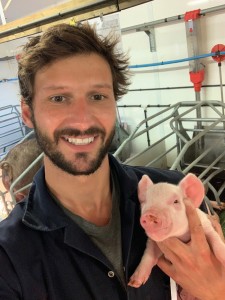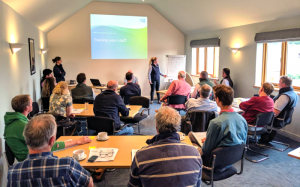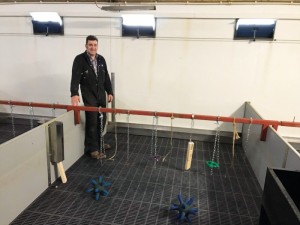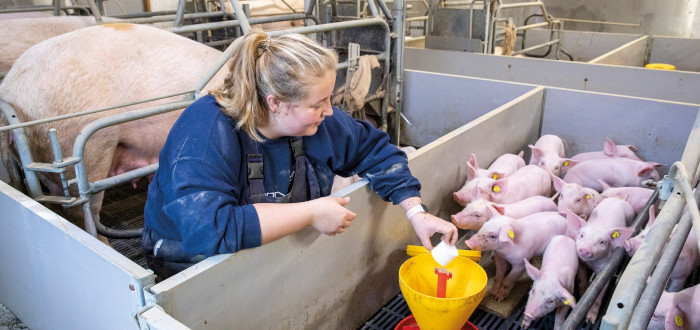While there continue to be many challenges around the recruitment and retention of the industry’s current and future workforce, a great deal of work has already gone in to increasing the pig industry’s level of training, skills and professionalism.
However, there is a catch-22 situation to some extent. With labour still short on many farms, it can make it harder to create time for training, personal development or improving staff facilities and work-life balance – and that includes owners or managers.
The Institute of Agriculture and Horticulture (TIAH) report on labour and skills highlighted effective management skills as a priority area to work on. Three quarters of employers across agriculture have not had any formal management training themselves in the last three years, and it is likely that many had not taken part in any training previous to that.
Manager key to retention
Management and communication not only influence performance of staff members and pigs, but also recruitment and retention.
“People don’t leave companies, they leave managers,” according to Nick Lawson, human resources and general manager at Suffolk-based genetics company Rattlerow Farms, which employs 180 staff in total.
Rattlerow develops team members by offering both in-house and industry-recognised training, in technical and leadership skills.
“We favour promoting from within wherever possible,” Mr Lawson added. “To do that, we aim to hire good people from the start and continue to invest in their training. When promoting into management positions, we look for someone who shows good decision making skills – it has very little to do with pig management. It’s about people.”

Northamptonshire pig producer Charlie Thompson shared the same view. Speaking on an AHDB podcast after attending its AgriLeader Forum, he said: “Falling out and not getting along are what make people leave jobs, more than the technical side. Technical skills are almost easier to teach than the communication and team skills.”
One of the messages he took home from the forum was that there is a difference between a boss and a leader. It’s always hard to make time to get off the farm, Mr Thompson acknowledged, but producers need to invest in their own skills, regardless of their business size. “It only takes two people to fall out. That communication aspect is key, no matter what size team you’re working in. Even if you’re working on your own, it’s about the relationships you build with suppliers,” he said.
AHDB knowledge exchange manager Andrew Palmer pointed out that, with greater turnover of staff, the pace of progression on a lot of farms is speeding up, with people taking over supervisory or management roles earlier than expected. He agreed that there are a lot of people who would benefit from management training – to help fulfil their own potential and that of their team and wider business.
Recruiting the right people for particular roles and managing the team as a whole is often complex as every manager and employee is different in skills and ambitions. Some are looking for rapid development and career progression, while others simply want to enjoy their job. The aim should be to ensure a positive and rewarding experience in pig farming for everyone.
Plus, there is a value in professionalism and its impact on industry reputation, but the industry is not currently perceived as being professional enough. “This also links to recruitment and retention, and training has a key role in improving all these areas,” said TIAH’s head of partnerships and membership, Tess Howe.
Retention cheaper than recruiting
Retaining people and getting the best out of them is far cheaper than constantly recruiting, said Mrs Howe. “One recruitment will typically cost an average of 18 months’ salary. So, we need the skills to recruit the right people in the first place, looking further afield and not just relying on word of mouth, which limits your potential labour pool significantly.”
Some farmers have recruited people with retail, hospitality or military backgrounds, for example, and it’s worth considering or trialling different working hours, rotas or team structures.
“Once recruited, we need to retain people, which will rely on management skills again,” said Mrs Howe. “One of the best ways of retaining people is looking after them and providing plenty of opportunity for development – formal and informal – and to take on responsibility.”
She encourages producers to think about how to get the most out of investment in training courses: “As well as booking someone on a course, give them time to prepare beforehand and afterwards to reflect on the learnings and how they can be applied,” she said.

Mr Palmer added: “More and more pig producers are seeing the need to introduce human resource management, for example staff induction policy and development plans. “Pay has always been a big driver but there’s increasing understanding of the value of other rewards, such as an earlier finish time or more holiday allowance for longer-standing staff, plus opportunities for personal development.”
Value of training
“Many producers place value on staff training and see it as an investment in their business and it would be good to see this continue to increase,” said Mrs Howe. “One of the barriers, though, is that the industry needs a clearer pathway and structure for training, which is one of the reasons why TIAH was set up.”
The training landscape offer covers a range of needs, but there is always more to be done to improve the number and type of opportunities available, agreed NPA chief policy adviser Rebecca Veale.
“Elements of training are mandatory for Red Tractor, for example, relating to key health and welfare practices on farm, which is a good thing,” said Ms Veale. “But it’s important to get the level of training right and recognise differences between levels of practical skills. People learn in different ways. We should also acknowledge that some people might not want to move beyond a certain level.”
For Mr Lawson, training is not just about what people learn but why the knowledge and skills are important and the difference they make.
“It’s important staff know how to do the basics right and also have the chance to go further with something they find interesting because people generally want to learn, grow and develop and that responsibility’s on us,” he said.

“As employers, our attitude to training is so important to staff and it also helps them to feel valued. After six months in the role, we like to get people enrolled on AHDB’s Stockperson Development courses. We also joined up with a customer to put a group of up-and-coming managers through the Institute of Leadership and Management course.”
Formats are varied, too, with the business continuing to offer online training sessions, between an hour and an hour and a half long. People can attend in-person and it is streamed live online.
Industry training opportunities
AHDB’s leadership and management resources provide help for farming businesses throughout the five stages of the labour lifecycle:
1. Recruiting people: including advertising and becoming an employer of choice.
2. Onboarding people: for example, inductions and appraisals.
3. Managing people: including coaching, delegating tasks and performance reviews.
4. Developing people: building a skilled, confident team and retaining employees.
5. Progressing people: assisting staff through promotions or when they leave.
Helpful information is available on the AHDB website in bite-sized formats, so learning can fit around other commitments.
The latest round of Stockperson Development courses took place between autumn and spring at three venues, plus one virtual session which drew in 200 people.
Stockperson Plus has been redesigned; new topics have been added to the training, which will all be online, with options included for indoor and outdoor units and more technical detail.
“We’re also working on offering some training to fill the gaps, for example between Stockperson Plus and the AgriLeader programme, investing in a continued path for progression in pig production,” Mr Palmer added.
The PigPro service, which enables pig business members to track employee CPD and individuals to create an online record of their training, is now being transferred from AHDB to a new provider.
Reputation and Recruitment
Rattlerow links up with colleges as much as it can, for example by employing a student through the Pig Industry Scholarship Programme with Harper Adams University.
“As an industry, we’ve currently not got the right image and a real hurdle is awareness – young people simply don’t know much about it. We should do more to improve awareness of pigs at careers fairs and sell the opportunities for career progression and responsibility,” Mr Lawson added.

The team on Harper AdamsUniversity’s pig unit, along with lecturer Alan Stewart, provide a unique set of opportunities for young people to both learn about pigs, carry out research and gain hands-on experience of a commercial farm. Unit manager Matthew Swaine said: “Students have the chance to do pretty much all the tasks we do, with guidance from the team, from feeding sows to weaning piglets.”
There are a variety of courses at the vet school as well as agriculture, with students from a range of backgrounds from farmers’ sons and daughters to young people from inner cities, who are often the most fascinated and curious about the pigs.
The university’s pig unit also offers visits for other schools and colleges, including food technology students, and is planning to take part in Open Farm Sunday next year.
Harper has just teamed up with Tesco to launch of a new programme to help the next generation of farmers. The Future Farmer Programme, announced in late-July, will provide 75 young farmers with face-to-face and online training on implementing sustainable agriculture practices.
There are also opportunities to use social media to boost the image of the industry to those seeking new careers, members of the ‘Young Guns’ panel at May’s Pigs Tomorrow conference pointed out. “We should promote pig farming to anyone who might want to get into it,” Norfolk producer Max Campbell said.
Hampshire producer Flavian Obiero said he received positive feedback ‘nine times out of 10’ when he posted on social media. “If we don’t engage with the public, things won’t change,” he said.
Find out more
- The Institute for Agriculture and Horticulture (TIAH), helping develop skills and lifelong learning: https://beta.tiah.org/
- TIAH’s report on Labour and skills in the horticulture and agriculture sectors in England: https://tiah.org/web/guest/lmi-research
- AHDB Stockperson Development Scheme, workshops covering each stage of pig production: https://ahdb.org.uk/stockperson-development-scheme
- Stockperson Plus, workshops designed to build on existing pig husbandry knowledge: https://ahdb.org.uk/stockpersonplus
- AgriLeader Programme, focusing on leadership, growth and resilience: https://ahdb.org.uk/agrileader
- Pig Industry Scholarship, open to Harper Adams University students, recruiting highly qualified and committed young entrants into the pig industry: https://ahdb.org.uk/pigindustry-scholarship
- Institute of Leadership and Management course: https://www.imd.org/lp/personal-leadership-programs




